How 5 Potentially Great Movies Got Derailed By Offscreen Nonsense

Hollywood has proved that it's willing to turn literally anything into a movie, from children's toys, to Reddit posts, to E.L. James novels. So, if you ever notice a film-worthy property that has remained conspicuously un-adapted, you can bet your butt that it's not for lack of trying. In fact, some of the stories behind these non-adaptations would make pretty good movies of their own (mostly comedies, with some hints of psychological horror).
Gore Verbinski's R-Rated BioShock Movie Is Dead Due To Watchmen
Video game adaptations tend to be utter garbage for one simple reason: It's hard to turn a plot like "portly Italian steps on hundreds of turtles" into a coherent screenplay. If there's one game that could break the curse, though, it's BioShock. Why? Because it already has a more cogent story than most movies.

The game's critically acclaimed storyline (centered on a dystopian underwater city created by a combination of Walt Disney and Ayn Rand) is ripe for the taking -- and there's one director willing to do it. Gore Verbinski of Pirates Of The Caribbean fame is a big fan of BioShock's "cinematic potential" and "strong narrative," and we've already talked about why he would actually be perfect for this adaptation (assuming he doesn't succumb to the Burton Syndrome and cast Johnny Depp for every part).
Verbinski was all set to shoot a BioShock movie in 2009, and fittingly for someone named "Gore," he wasn't planning to shy away from the game's violence and general messed-up-ness. In his own words, he "just really, really wanted to make it a movie where, four days later, you're still shivering and going, 'Jesus Christ!'" The movie's concept art confirms that, at the very least, this thing would have been visually amazing:
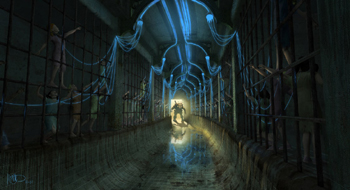
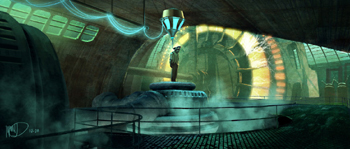
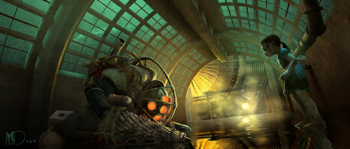
But then, only eight weeks before shooting was to start, Universal Studios pulled the plug. What happened? Apparently, Watchmen did.
Verbinski wanted between $160 and $200 million to properly recreate the underwater city of Rapture, but after Zack Snyder's dour superhero slo-mo-fest underperformed, Universal got nervous about financing such an expensive R-rated film. Verbinski wouldn't budge on the rating or the budget, so that was it. The studio tried to keep going with another director, but the same problems came up again. Eventually, BioShock's creators decided they didn't need a stinking movie anyways.
We'd love to end this entry telling you that the recent string of R-rated genre hits proved those cowardly producers wrong, but it's not that simple: Deadpool cost only $58 million, Logan reportedly $97 million, and Mad Max: Fury Road didn't exactly make it rain (by Hollywood standards). Shooting an underwater city probably won't be affordable until we're actually living in one, so cross your fingers for more climate change, gaming fans!
Like his creation Cthulhu, horror author H.P. Lovecraft has managed to indirectly wedge his face-tentacles into everything you love. He's inspired such disparate works as Dungeons And Dragons, Evil Dead, and even Conan The Barbarian -- and yet, very few of his works have been directly adapted into movies. For instance, there's never been a film adaptation of his classic novella At The Mountains Of Madness, the lovely story of a bunch of scientists who stumble upon forgotten horrors during an Antarctic expedition, and end up getting slaughtered or losing their minds.
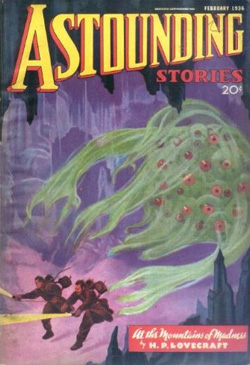
Guillermo Del Toro, no stranger to giant monsters from other dimensions, has been trying to adapt Mountains for decades, but the project has been cursed by the unthinkable evils that rule the universe: Hollywood executives. Del Toro had a script ready as early as 1998, and at various points the project managed to attract serious interest from Warner Bros., Universal, and Steven Spielberg's DreamWorks Pictures. In 2010, Del Toro even convinced James Cameron to join as producer and had Tom Cruise in advanced talks to star (yes, we might have finally found out what Cruise looks like as an insane person).
The studios always ended up wussing out over the budget and dark tone, but Del Toro kept plugging away, convinced that this was something audiences had never seen before. That is, until he heard about a little movie called Prometheus. You know, the one about a bunch of scientists who stumble upon forgotten horrors during a galactic expedition, and end up getting slaughtered or crushed by slow-moving space donuts.
The similarities don't end there: Both Prometheus and Mountains involve the scientists discovering an ancient alien race responsible for creating humanity, as well some ugly-ass monsters hell-bent on destroying said humanity. Del Toro didn't want to cover the same ground as that film, so he announced that his project was on hold or dead. In 2013, he said he would give it one more try ... and that's the last anyone's heard of it. Oh, well, at least there's always the new Hellbo- Whoops.
Hamilton Won't Be A Movie For Decades Because The Creator Just Said So
Chances are that you've never seen Hamilton yourself (tickets go from $175 to $2,000 and are still constantly sold out), but you sure as hell have heard about it. It's a freaking cultural phenomenon. The Founding Father-themed hip-hop musical won 11 of its record-breaking 16 Tony Awards nominations, largely for its ability to achieve the impossible: making people pay "could have bought fairly high-quality cocaine" money to see something pertaining to Alexander "National Debt Ain't Nothing But A Thing" Hamilton.
Since Hamilton creator Lin-Manuel Miranda is all about making American history more accessible to the masses, a movie adaptation would make perfect sense, right? So thinks everyone, except Lin-Manuel Miranda. In a Rolling Stone interview, Miranda stated that if a film adaptation happens, it probably wouldn't be for at least 20 years. Partially, he wants to make sure people come see it in theaters now (even though 99 percent of us will never have the chance) ... but he also claims that the only good play-to-film adaptations are "all 20 years after the fact," giving examples like Cabaret or Chicago.
The thing is, Cabaret was only made eight years after the play. West Side Story, The Sound Of Music, Oliver!, The Music Man, My Fair Lady, Guys And Dolls, Hairspray -- all had acclaimed movies within five to eight years of the musical. The Grease movie was released only seven years later, and people love that retroactively creepy crap. Does Miranda think it was actually made in the '50s because of the wardrobes?
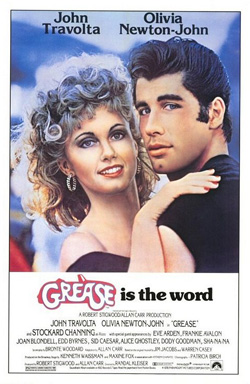
At most, those suffering from Hamilust will have to settle for watching a filmed performance of the play, but there are two problems with that: 1) Miranda says he hasn't decided what to do with the only recording of the original cast, joking (we think?) that he'd throw it in a vault, and 2) no one in the history of humanity has enjoyed a fixed-camera movie of a play. You might as well sneak into one of the inevitable rip-off productions that high school drama clubs will be putting on for years to come. UPDATE: This last section didn't age well.
Steve Carell's Real-Life Comedy About North Korea, Pyongyang, Was Shelved Because Of The Interview
North Korea has been responsible for a lot of terrible things over the years, but there was one time when they actually tried to save us from a lurking danger we ourselves didn't fully understand: Seth Rogen's The Interview. In what we naively thought would be the most bonkers international incident of this decade, Kim Jong-un's regime took offense at something in the movie (presumably the part about Rogen and James Franco assassinating him, but maybe they're just tired of stoner jokes) and allegedly hacked Sony Pictures in retaliation.
As a result, most screenings of the movie were cancelled and the film was banished to the wasteland of home video.
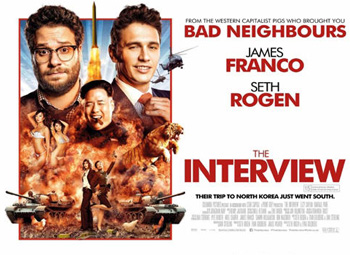
However, this Chinese food-fart of a movie wasn't the most tragic casualty of the Sony hack mess: that would be Steve Carell's Pyongyang, which was a story that actually deserved to be told.
Based on a 2004 autobiographical comic book, Pyongyang details author Guy Delisle's experiences in the North Korean capital, where he worked as the liaison between a French animation company and a local studio. That studio's signature creation, by the way, is an adorable propaganda series starring a squirrel and a hedgehog, imaginatively titled Squirrel And Hedgehog.
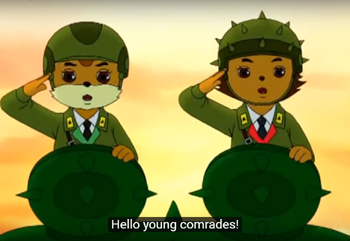
Because of his particular role, Delisle was given unprecedented access to parts of the country usually hidden from outsiders. His book is a retelling of all the bizarre things he saw and experienced in that crazy-ass regime -- a concept that apparently made Gore Verbinski's ears perk up when he heard about it. In 2013, New Regency announced Verbinski would direct a "dark comedy" based on the Delisle's experiences, and eventually added Steve Carell as the lead. It would have been an intriguing combination of awkward situations ...
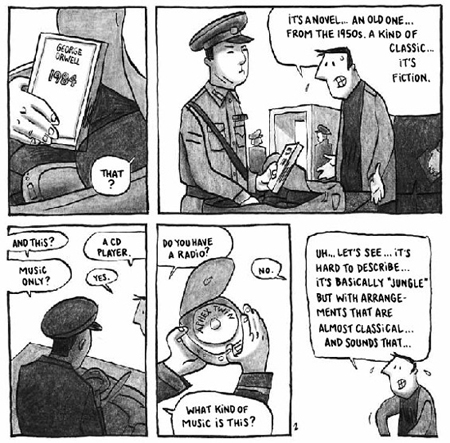
... and the obligatory "creative liberties" Hollywood would have taken to make the story more like a spy thriller. Either way, expect a lot of Carell screaming in panic.
Unfortunately, thanks to Rogen shoving his dick jokes into the nuclear hornet's nest, the movie was dead before it could really take off. New Regency didn't think they could risk a controversial movie of their own, while Verbinski welcomed the possibility of World War III, stating, "I find it ironic that fear is eliminating the possibility to tell stories that depict our ability to overcome fear." To which the studio probably responded: "Yeah, but nukes. Right?"
J.D. Salinger's Catcher In The Rye has long been considered by hipsters ( and assassins) to be the greatest book against phonies ever written. Holden Caulfield's story of self-discovery mirrors that of many a pissed-off, surly, uniquely rebellious teenager -- so, all of them, basically. That probably explains why entire generations of actors, from Marlon Brando to Leonardo DiCaprio, have tried to get the movie done with themselves in the lead.
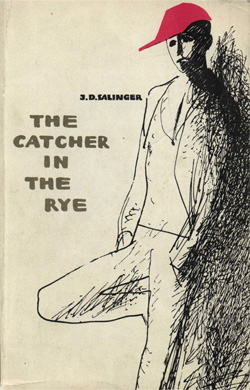
The problem is that, like his boy Caulfield, Salinger was on a bit of a crusade against the phonies of the world -- and to him, no one was phonier than Hollywood (not sure how he got that impression).
Salinger didn't always feel that way. Early in his career, he sold the rights to his short story Uncle Wiggily In Connecticut, a commentary on materialism in the post-WWII era. According to his assistant, Salinger "thought they would make a good movie," which wasn't an unreasonable assumption considering that the script would be written by the screenwriters of Casablanca, Julius and Philip Epstein.
So what did the Epsteins do? They changed the name to My Foolish Heart, ditched all the social commentary, and turned the story into a sappy romantic tale.
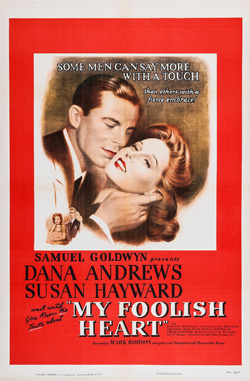
Even though the film was a commercial hit, Salinger hated it so much that he refused to allow any more adaptations of his work. Including Catcher In The Rye. Of course, there might be another reason why he turned down all those offers from famous actors: According to his one-time girlfriend, Salinger thought only he himself could play Caulfield. It's probably a little bit of column A, a little bit of column B.
Anyway, if you excitedly thought that Salinger's death might finally bring about a Catcher adaptation, then you're 1) a bad person, and 2) wrong. The people who manage his trust were fully aware of his aversion to licensing out any of his works, and will continue his crusade for generations to come. On the upside, think of all the murders from illiterate would-be killers we're avoiding this way.
Also check out The 36 Greatest Shows and Movies Ever to Almost Happen and 5 Incredible Real Video Games (You'll Never Get to Play).
Subscribe to our YouTube channel, and check out 5 Movie Epilogues That Should Have Been Sequels, and other videos you won't see on the site!
Follow us on Facebook, and let's best friends forever.